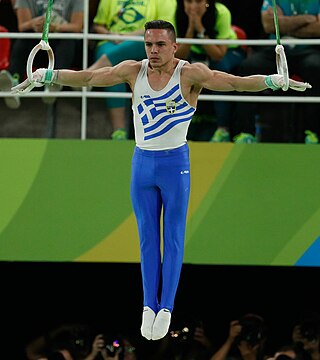Iron cross (gymnastics)
Gymnastics skill From Wikipedia, the free encyclopedia
An iron cross, also known as a crucifix[1] or cross,[2] is a gymnastics skill on the rings in which the body is suspended upright while the arms are extended laterally, forming the shape of the Christian cross. It is a move that requires significant shoulder and bicep tendon strength.




The International Gymnastics Federation Code of Points refers to the skill as a cross and lists it as a "B" difficulty value strength hold element.[3][4]
Variants
Variations of the iron cross listed in the FIG Code of Points include:
- L cross (B difficulty): the cross is performed with the body held in an L-sit position.[4]
- V cross (C difficulty): the cross is performed with the body in a tight piked position and the legs held vertically.[4]
- Inverted cross (C difficulty): the cross is performed in an inverted (upside down) position.[4]
- Maltese cross or swallow (D difficulty): the gymnast holds his body parallel to the ground at ring height with arms extended laterally.[4]
- Victorian cross or inverted swallow (E difficulty): an inverted Maltese cross, with the body held parallel to the ground and facing up.[4]
See also
References
External links
Wikiwand - on
Seamless Wikipedia browsing. On steroids.
